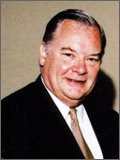205th ECS Meeting | San Antonio, TX | May 10, 2004

Molecular Engineering in an Age of Discovery and Information
In an ECS meeting first the original plenary speaker could not make it to the meeting because of weather-related transportation problems. Richard Alkire stepped into the breach admirably and very kindly agreed to provide a sneak preview of his Vittorio de Nora Award address. The speaker was introduced by Bruno Scrosati, ECS president, who started by noting that Dr. Alkire needed little introduction to an ECS audience because of his long-standing service and contributions to the Society. (Dr. Alkire served as president of the Society in 1985-86. He received the Carl Wagner Award in 1985, was made an Honorary Member in 1991, elected Fellow in 1992, and received the Acheson Award in 1996.)
Dr. Alkire began his lecture by noting that his father was a musician from whom he had inherited his own keen musical interest and broad keyboard repertoire on piano and harpsichord. He also paid tribute to the support from his artist wife, Melissa Huff. One of the slides showed her work “Iris Rising,” which embodied many of the elements of electrodeposition and surface finishing technologies. The lecture took the audience back to the early days of the Society when it consisted of the chlor-alkali, aluminum, and electroplating “tribes.” The speaker then noted that the 5 x 5 matrix with thermodynamics, kinetics, conductivity, mass transport, and current/potential distribution as the column “vector;” and aluminum, chlor-alkali, electroplating, batteries/fuel cells, and corrosion as the row “vector;” was now full with all the matrix elements fairly well understood. He noted evolving trends in electrochemical science and technology in the areas of instrumentation and novel materials and electrolytes such as ionic liquids. Dr. Alkire then described his approach to R&D problems: first identify the key elements of a problem and then solve it with a combination of modeling and experiment. His “pig plot” showing the concept of scaling was received with mirth and amusement by the packed audience present for this Monday morning talk. Dr. Alkire pointed out that engineers follow the markets and add science as they go. As an example of the research approach in the Alkire group the problem of on-chip Cu interconnects was briefly mentioned.
Dr. Alkire then switched gears and talked about the broader perspectives in scientific and technological endeavors. He talked about system complexity and star formation regions, NSF’s Earthscope rollout, and grid computing in this context. He noted that while the spectacular advances in computing power were impressive, we should not lose sight of the importance of scientific data. He then showed a triangular diagram with discovery, information technology, and molecular engineering at the apexes with barriers interposed between the three pairs of elements of R&D endeavor.
A related account by Alkire and Chapman on “Perspectives on Electrochemical Engineering” that appeared in Interface (Vol.12, No. 4, winter 2003, p. 47) was cited by the speaker in his lecture and may be consulted for further details.

